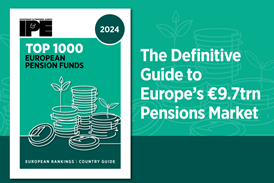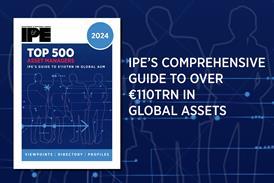More comment – Page 6
-
 Opinion Pieces
Opinion PiecesViewpoint: Macron’s reform paves way for development of French second- and third-pillar pension
The rationale of the reform is simple: the rising life expectancies combined with decreasing birth-rate have accelerated the aging of the French population
-
 Opinion Pieces
Opinion PiecesViewpoint: Let us redefine industrial policy
Peter Kraneveld proposes to think in terms of ‘economic change policy’ instead
-
 Opinion Pieces
Opinion PiecesEurope escaped the Great Retirement Boom but watch out for the crunch
Continental Europe appears to have largely escaped the trend known in the US as the ‘Great Retirement Boom’, where an economically comfortable cohort of 50 to 64-year-olds has retreated from work in the post-COVID period.
-
 Opinion Pieces
Opinion PiecesResistance to Germany’s new buffer fund proposal
Last year, the manager of Germany’s pay-as-you-go first-pillar scheme, Deutsche Rentenversicherung, recorded income of €363bn, the largest share coming from contributions (€275.6bn), and €87.4bn in public subsidies.
-
![RobertGEcclesPhoto[1]](jpg/142823_robertgecclesphoto1_404467_crop.jpg) Opinion Pieces
Opinion PiecesESG remains mired in politics in the US
“I am not going to use the word ESG because it’s been misused by the far left and the far right,” said BlackRock CEO Larry Fink in a conversation at the Aspen Ideas Festival in June.
-
 Opinion Pieces
Opinion PiecesConcerns over plans for Australian super funds to provide advice
In what some see as a controversial move, Australia’s Labor government under prime minister Anthony Albanese has reformed the nation’s financial advice industry, opening the door for industry superannuation funds to offer financial advice to millions of members.
-
 Opinion Pieces
Opinion PiecesHow to improve investment committees
Most asset management firms, private and public institutional investors and family offices have investment committees. Poorly designed boards can potentially destroy substantial value in the investment management industry, yet little research is available. I would like to propose a new way to think about the governance of investment committees.
-
 Opinion Pieces
Opinion PiecesCambridge and Westminster: a tale of two pension schemes
The Houses of Parliament and Cambridge University are two venerable British institutions. But the differences in how they run their pension arrangements illustrate the contrast between the UK-style pooled liability-driven investment (LDI) and a more traditional form of pension investing, no longer as popular in the UK but still common elsewhere.
-
 Opinion Pieces
Opinion PiecesViewpoint: How to prepare your scheme for the buyout backlog
Schemes must proactively prepare for major delays in risk transfers
-
 Opinion Pieces
Opinion PiecesViewpoint: Is long-term benchmarking realistic?
Instead of asking ‘what is a long-term model for investment benchmarks,’ we can ask ‘how many institutions view long-term benchmarking as practical?’
-
 Opinion Pieces
Opinion PiecesViewpoint: It’s the government’s move now
Pension funds should urge governments to support new products and habits to reduce CO2 emissions
-
 Opinion Pieces
Opinion PiecesViewpoint: Climate change action is failing
Recent research showed that around two in three respondents in financial organisations did not believe their own climate promises could be kept in time
-
 Opinion Pieces
Opinion PiecesViewpoint: Breaking the banks
Pension funds should ally themselves with activist investors to break up the hegemony of large banks
-
 Opinion Pieces
Opinion PiecesCapital competition: where does it leave sustainability goals?
For pension funds and other similar large institutional pools of capital, there is significant pressure from politicians to invest in politically favoured domestic sectors – like renewables or high-growth sectors like venture capital.
-
 Opinion Pieces
Opinion PiecesLessons learned from Berlusconi’s pension reforms
To some, the death of Silvio Berlusconi on 12 June this year, is the end of an era for Italian politics. Berlusconi was the longest-serving prime minister in the history of the republic and a highly controversial figure, at home and abroad. He can be described as the first modern European populist leader.
-
 Opinion Pieces
Opinion PiecesNotes from the Nordics: NBIM still learning on equal pay after winning employment case
Norway’s sovereign wealth fund has hailed the benefits of litigation abroad to drive its corporate governance agenda. Closer to home, victory in an Oslo employment case may have rung decidedly hollow for Norges Bank Investment Management (NBIM).
-
 Opinion Pieces
Opinion PiecesHarnessing the power of corporate governance
Pension funds and other institutional asset owners have significant influence when it comes to voting in companies’ annual general meetings (AGMs). The consequences of their voting decisions can have a profound impact on company share prices and long-term objectives, especially in the context of climate change.
-
 Opinion Pieces
Opinion PiecesLetter from Australia: Retail funds lured by private markets
Australia’s retail funds are trying to navigate the unfamiliar terrain of private markets as they seek to lift their performance.
-
 Opinion Pieces
Opinion PiecesLetter from US: Annuities move into the US market
Three of the largest players in the US pension industry are launching new products that offer annuities as a retirement savings distribution option. Millions of Americans will soon have access to pension-like investments in their 401(k) plans thanks to BlackRock, Fidelity Investments, and State Street Global Advisors. The other large player in the US market, Vanguard, will not take part in this new trend.
-
 Opinion Pieces
Opinion PiecesGuest viewpoint: Green bonds require better coordination for real impact
Worth approximately $128.3trn (€117trn), the global bond market could add billions to the global effort to reach the United Nations’ sustainable development goals (SDGs). Yet only a fraction of the market currently consists of green, social and sustainability (GSS) bonds, and of that very little is being issued in developing countries. In 2022, annual GSS bond issuances stood at under 10% of overall bonds and only 13% of them came from entities in developing countries, a number that dwindles to around 5% when excluding issuers from China.





